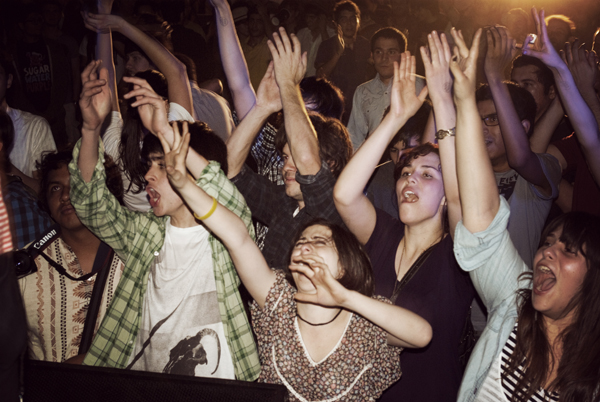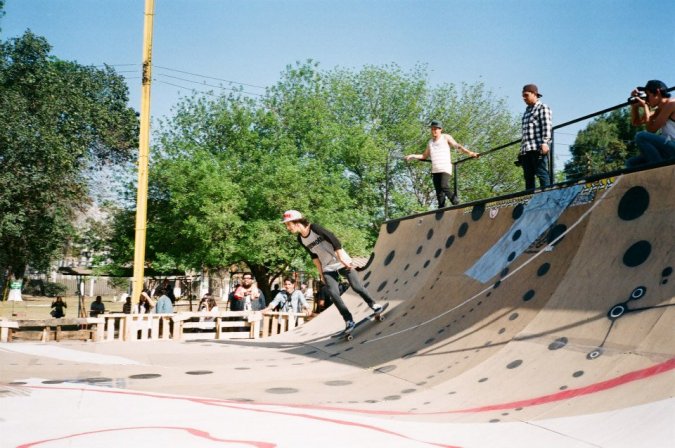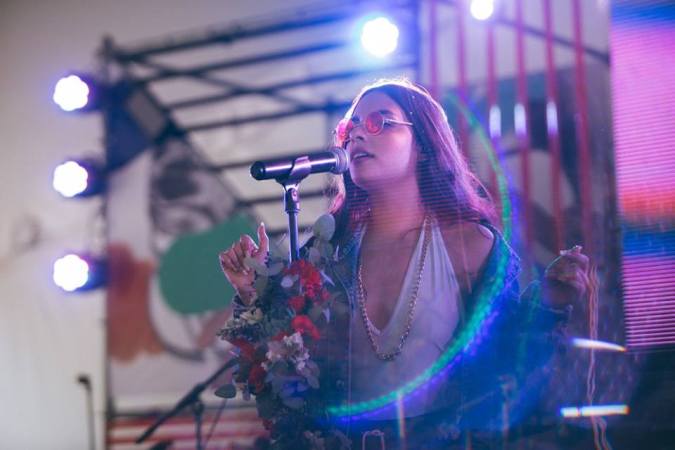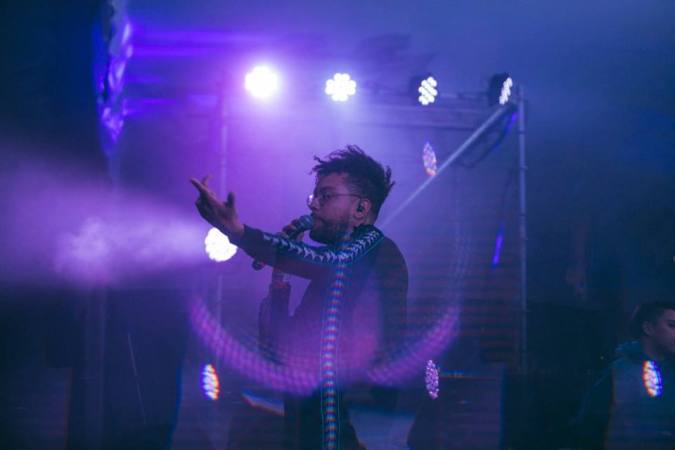With the proliferation of the music festival economy, there’s hardly any need for fanfare when a festival reaches its 10-year anniversary. However, in the case of Mexico’s NRMAL, 10 years marks a milestone that few events of its scale are capable of. Considering that NRMAL’s story includes bands that made their debut in Mexico 40 years after their inception to collateral violence from the war on drugs, it’s a miracle NRMAL has reached this watershed moment, let alone established itself as one of the most beloved festivals in Latin America. To say it’s worth celebrating is an understatement.
NRMAL has become one of the most important festivals in Mexico, without attracting massive crowds or relying on excessive corporate branding. Over the course of its 10 editions, the festival has booked artists from across the globe, including alternative legends like Slowdive, Psychic TV, and Brujería, to early appearances of soon-to-be game-changers like Grimes, Twin Shadow, and Omar Souleyman. And of course, its Latin American and Latinx talent has included current favorites like Lorelle Meets The Obsolete, Las Robertas, Alex Anwandter, Dávila 666, Javiera Mena, Los Mundos, Meridian Brothers, Föllakzoid, and many others. NRMAL is also an effort to build bridges between different communities, forging transnational alliances within the musical community, especially in Latin America. It’s a festival for the music-obsessed and a gathering that feels more like an annual reunion of family and friends. Rather than paying attention to trends or unachievable economic growth, NRMAL has chosen to evolve along with its listeners.
“It’s still a small festival,” director Moni Saldaña says during an interview at NRMAL’s headquarters. “It’s been very difficult to keep this going so we’re really happy that we’re still doing it, that we’re still here and most importantly, that we’re still doing it our way. It’s the type of festival we want to do and we keep booking the types of bands we want, so it’s a great feeling.”

The festival organizers’ main priority has always been to host the event without compromising any major part of their eclectic, independent vision, and they manage to achieve this through some careful planning. Unlike most major fests, NRMAL comes to life thanks to a team of just five people. They have shut down most of their other enterprises – among them hosting smaller events, running venues, an agency, and a blog – to focus on the festival itself. As a result, NRMAL provides a more honest experience for fans, without making attendees feel like every inch of of the grounds is occupied by brand logos. “Nobody involved is a businessperson and that makes me happy,” Saldaña shares. “We don’t do it for the money, we do it because we’re music fans. Every time we have to make a decision we say, ‘if we were the audience, would we like this?’ I don’t think we’re the perfect festival or the ideal festival experience, but I believe we make a difference, we try to be honest with fans and artists. They know when something is bullshit. They feel close to us because we have been upfront about our mistakes and stuff.”
NRMAL also has a rare sense of transparency when it comes to the visibility of its staff. Moni regularly grants interviews leading up to the festival, and in past editions, the team has hosted keynotes and workshops about the independent music business through NODO, a platform founded by Alfonso Muriedas, who is one of the five members of the NRMAL team. Even founder Pablo Martínez, who has maintained some anonymity, granted an interview with The Creative Independent in 2017. Saldaña thinks this openness has benefited the festival. Her role as a director has made a difference as well, resulting in invitations to speak at roundtables and conferences supporting women’s empowerment initiatives.

“It’s not my intention to become the face of the festival,” says Saldaña. “But I’m aware of my position and I have something that maybe some people need to hear. When I was younger, I used to say shit like, ‘if I was a boy, maybe I could join a band’ and that’s how I grew up. Now, most men who run festivals have a right-hand woman who gets things done and kicks ass. Believe me, I know them. All of them. But there’s no visibility for these women. In this age, and especially in this country, it’s important to me as a woman to have that visibility. It’s important to let women know there’s another way.”
Well before conversations about the representation of marginalized artists at major festivals, NRMAL demonstrated a commitment to diversity, whether it was about sound, geography, or gender. Currently, NRMAL is the festival with the most women and non-binary performers in Mexico; 70 percent of these artists were featured in its 2019 edition. This eclecticism is inherent to the festival’s origins; organizers would initially invite bands to Monterrey from SXSW to play in Mexico. Ever since, it has remained a priority to book artists that otherwise would not be able to visit the country.
NRMAL began a few years before the first edition of the festival in 2010. Pablo Martínez and Lucas Cantú set out to build a local scene through shows and parties (Cantú has since left NRMAL, but Martínez remains the fest’s CEO). At the time, Moni Saldaña – a lifelong music fan who would drag her friends to shows from an early age – was a college student who was switching career paths and working part-time at a magazine. Having fallen in love with their events, she wrote an email to the NRMAL blog, offering to write concert reviews. When the first festival was coming together, Saldaña volunteered and ended up contributing to every aspect of the festival without any prior experience.”I almost flunked an exam because of NRMAL!” she says. After that, Martínez asked her to formally join the team.

Prior to NRMAL, music festivals were not the most common live music experiences in Mexico. After the legendary Avandaro Festival in 1971, which resulted in significant government censorship, no major music festivals took place in the country until the first edition of Vive Latino in 1998. In the 2000s, heavily sponsored festivals featuring international acts like Manifest, Mx Beat, and Sonorama, as well as a Mexican version of the electronic Mutek festival, began yearly traditions before the bubble burst around 2009, when most of these were canceled for good. Only Mutek survived. Coinciding with the first NRMAL, OCESA – the world’s third biggest international promoter and entertainment agency – launched their own alternative music festival, Corona Capital, marking a new era of music festivals in the country.
Before NRMAL could really get off the ground, violence had already presented itself as a challenge. The week following the first edition, two students were killed by soldiers who mistook them for an armed group that had fired at them earlier on March 19. On August 29, 2011, members of the Zetas cartel stormed and set fire to the Royale casino in Monterrey. The war on drugs escalated violence in the city to unprecedented heights. In 2010, another festival, MtyMx, had most international acts canceling their appearances at the last minute due to security concerns. “All the local people were like ‘what the fuck is happening?’” remembers Saldaña.

However, the second edition of NRMAL continued as planned, with just Las Robertas, Thee Oh Sees, and Silje Nes making the trip abroad. “[That edition] was a statement about not letting the flame burn out. We couldn’t let the situation kill us so we said ‘fuck it’ and did the fest. We had some advantage because La Alianza Francesa [the festival venue] is located in San Pedro and allegedly was agreed to be off-limits by the local government and narcos.”
Thankfully, violence in Monterrey subsided in the following years, allowing NRMAL to march on. By 2013, NRMAL leveled up and booked more than 100 acts to perform between the main event and various showcases, something that Saldaña says nearly broke her. “On Sunday, I called Pablo crying, told him I was quitting, and he told me that everything was going to be okay, and that was that. From then on, we could do no wrong.”

In 2014, to celebrate five tumultuous and successful years, NRMAL decided to throw two festivals, one in Monterrey and another in Mexico City, an ambitious endeavor that the team pulled off. However, the following edition came with the biggest change in their history: a permanent move to Mexico City. Struggling with adequate venues and elusive permits from the local government, the team found a more inviting environment in the nation’s capital, but that didn’t make it an easy choice. “We tried to keep the two festivals,” says Moni. “We wanted the best for NRMAL and it made sense to move to Mexico City. It was a tough decision because most of us are from Monterrey, but it was necessary to keep running the festival as best as we could.”
“NRMAL wouldn’t exist if it wasn’t born in Monterrey,” Saldaña continues. “We didn’t have access to many things; there was no scene. We built something we wanted to see, made a festival so we could see bands that we couldn’t otherwise. I’m not sure if it could have started anywhere else.”
For the 10th edition of NRMAL, a typically eclectic selection of artists – from Spiritualized to Canalón de Timbiquí to Death Grips to Michelle Blades & Los Machetes – took over the grounds of Deportivo Lomas Altas, in Mexico City. Judging by this year’s installment, one thing remains clear: the festival’s commitment to forging bonds within the musical communities of Latin America and the world, but especially within the Mexican scene. Crowds showed up early to witness local underground legends-in-the-making El Shirota and Vyctoria, and grew larger by the time Latin American dream pop messengers Rubio and Sexores took the stage. There has been a continuous boost in attendance, and the 2019 edition was no exception, without any of the troubles that come with crowded festivals. This is no coincidence; Saldaña tells us that their idea of expansion doesn’t mean attracting more people to the festival, but rather creating a more enjoyable experience for everyone involved. “It’s horizontal growth rather than vertical growth,” she says.
Next year, there will be another edition of NRMAL and with it, more chances of experiencing something otherworldly within the reaches of music fans all over. But for now, there’s the matter of celebrating 10 years of a day for every kind of music fan to enjoy as much as they can. As for the team behind this, it’s a source of happiness. “For me, it’s like, ‘fuck! Has it really been 10 years?’” says Saldaña. “I feel privileged. It’s a dream come true that I do this for a living, something I love so much.” When there’s so much passion for music gathered in one place, the product can only be something very special and memorable. As ubiquitous as festivals have become, it’s refreshing to find a true celebration of music.




